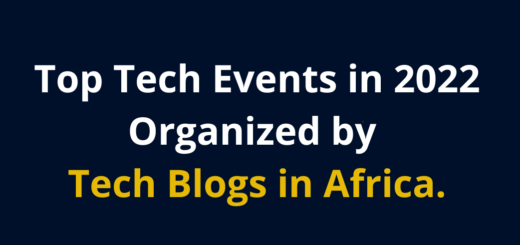International Day for Girls in ICT: Digital Skills for Life; Tech-Influencer, Contentkwin Speaks.

The fourth Thursday of April every year is recognized as the International Day for Girls in ICT, a day dedicated to raising awareness about the gender gap in the information and communication technology (ICT) industry. Despite advancements in technology, the gender gap in ICT remains significant, with women still underrepresented in ICT-related fields. The day aims to encourage more girls to pursue careers in ICT and to support women in the industry.
The day is an opportunity to reflect on the importance of diversity and inclusion in the ICT industry. Women bring unique perspectives, skills, and experiences to the industry, and promoting gender equality in the ICT sector can lead to better innovation, creativity, and problem-solving.
The International Day for Girls in ICT is celebrated globally with various events, workshops, and activities to promote ICT to girls and women. These events provide opportunities for girls to learn about the possibilities in the ICT industry, connect with other girls and women in the field, and gain valuable skills and experiences.
Organizations and individuals can support the International Day for Girls in ICT by promoting gender equality in ICT, encouraging girls and young women to pursue careers in the field, and supporting women already in the industry. This can be achieved by providing mentorship and networking opportunities, promoting equal pay and opportunities, and providing resources and training to enhance the skills of girls and women in ICT.
So guys, My name is Eni Nnendah Queen, I am the content marketing strategist and the teamlead of the Techblit blog.

As part of activities to mark this year’s International Day for Girls in ICT, I was invited to RivEthics on Radio. Rivethics is a civic education & public enlightenment show sponsored by Her Excellency Hon. Justice Suzzette Nyesom-Wike (wife of the Rivers State Governor), to promote behavioral change in society. The program airs on 5 different radio stations every Saturday and Sunday.
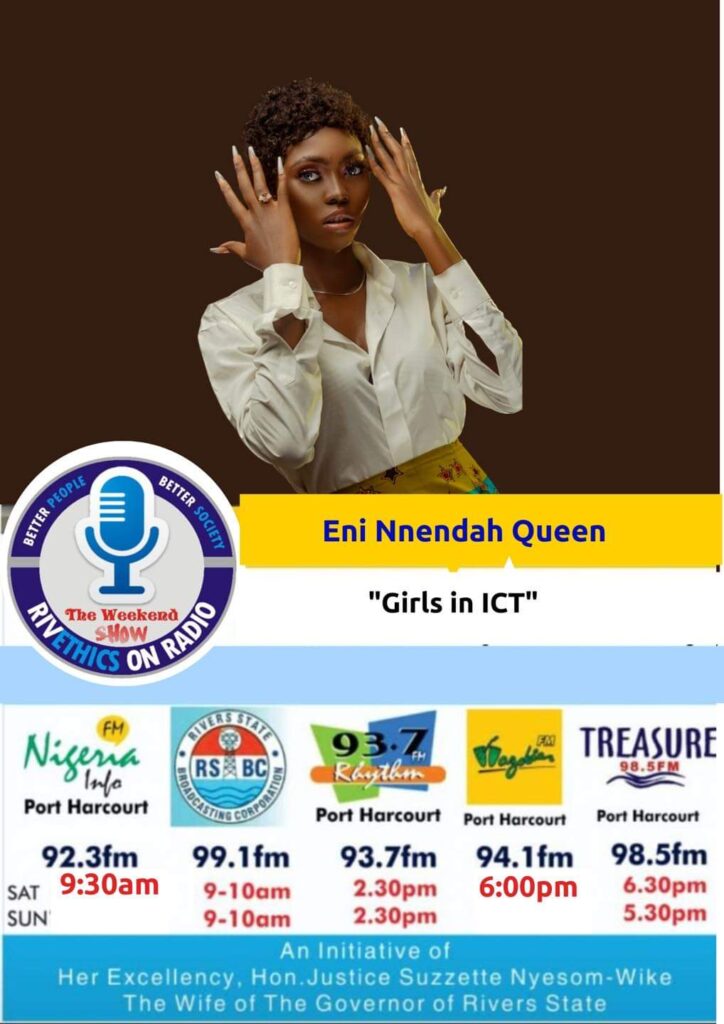
During my appearance on the show, I shared some thoughts about the International Day for Girls in ICT with the theme “Digital Skill For Life”. Here is a summary of my presentations on the Radio to celebrate the International Day for Girls in ICT. Enjoy!!!
The world has come a long way in terms of technological advancement, but there is still a considerable gender gap in the tech industry. According to UNESCO, only 3% of female students choose ICT-related fields for their higher education, and women hold only 24% of ICT jobs worldwide.
This disparity is not only unjust but also detrimental to the industry as a whole.
The International Day for Girls in ICT aims to raise awareness of this issue and inspire girls and young women to pursue careers in the tech industry. It also serves as a reminder of the vital role that women play in creating innovative solutions and driving technological progress.
The tech industry is constantly evolving, and it needs diverse perspectives to tackle the challenges of the future. Women are uniquely positioned to bring their experiences and perspectives to the table, and their contributions can profoundly impact the industry’s growth and development.
With technology playing a role in all kinds of careers, from art and history to law, primary teaching and graphic design, learning tech skills at a young age will set girls up for economic independence. And, the ICT sector needs more girls and women.
The jobs of the future will be driven by technology and innovation—65 percent of children entering primary school today will have jobs that do not yet exist.
This year’s theme for the International Day for Girls in ICT is “Digital Skills for Life“ The theme highlights the importance of empowering girls through technology and promoting their access to ICT resources. The goal is to inspire young women to pursue careers in ICT and break down the barriers that have traditionally prevented women from entering the field.
The day is celebrated globally with various events, workshops, and seminars aimed at encouraging girls to take an interest in ICT. These activities provide opportunities for girls to interact with women in the tech industry, learn about the latest trends and innovations, and develop the skills needed to succeed in the field.
There are many ways in which we can support and encourage girls to pursue careers in ICT. One of the most important is to provide access to ICT resources and education, particularly in underserved communities where girls may face additional barriers to entry. This includes providing access to computers, internet connectivity, and training programs that can help girls develop the necessary skills and knowledge to succeed in ICT careers.
Mentorship programs are also an excellent way to support girls in ICT. These programs connect girls with female professionals in the tech industry who can provide guidance, support, and advice as they navigate their careers. They can also help girls build networks and connect with other women in the industry, providing them with valuable opportunities for growth and development.
Girls and women face various challenges in accessing and succeeding in the Information and Communication Technology (ICT) sector in Africa.
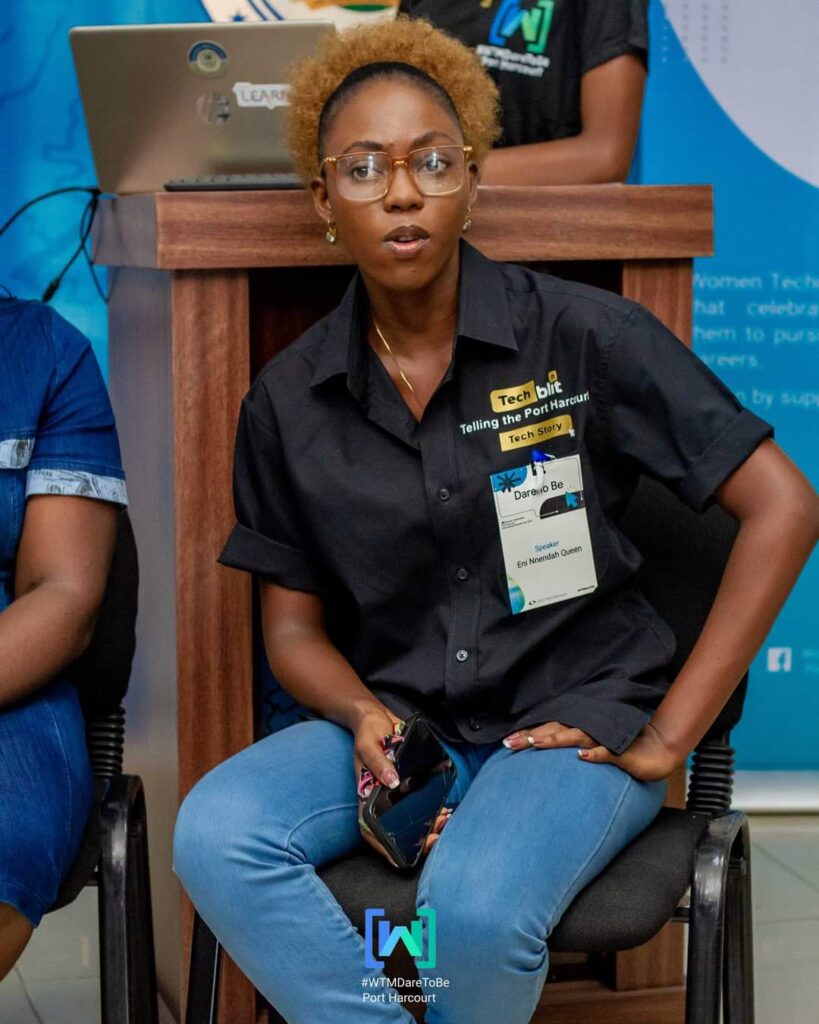
Let me share with us today 10 of these challenges that girls in ICT face here and I will also briefly suggest ways we can collectively solve the challenges
1. Gender bias: Girls and women face discrimination and bias in the ICT sector, leading to limited access to education, training, and employment opportunities.
Solution: Encourage and provide support for girls and women to enroll in ICT education and training programs. Encouraging and enforcing policies that promote gender equality in the workplace.
2. Lack of access to ICT education and training: Many girls and women in Africa lack access to ICT education and training, leading to limited career opportunities.
Solution: Increase access to ICT education and training programs for girls and women, especially in remote areas. Governments, NGOs, and private sector organizations should collaborate more to provide these resources especially for those in the remote areas.
3. Limited financial resources: Girls and women often face financial challenges in accessing education and training opportunities in the ICT sector.
Solution: Provide scholarships and financial aid to girls and women in need to attend ICT education and training programs.
4. Lack of role models and mentors: Girls and women may struggle to find role models and mentors in the ICT sector, leading to limited career guidance and support.
Solution: Encourage the development of mentorship programs and networks that provide guidance and support to girls and women in the ICT sector.
5. Limited access to technology: Girls and women may lack access to technology, such as computers and the Internet, making it difficult to gain the necessary skills for the ICT sector.
Solution: Governments and private sector organizations should work to increase access to technology for girls and women, especially in rural and remote areas.
6. Societal expectations: Societal expectations and cultural norms may discourage girls and women from pursuing careers in the ICT sector.
Solution: Work to change cultural norms and expectations that discourage girls and women from pursuing ICT careers. Promote awareness of the importance of gender diversity in the workplace.
7. Limited representation in leadership roles: Girls and women may face limited opportunities to advance into leadership positions in the ICT sector.
Solution: Encourage companies and organizations to promote gender di-versity in leadership positions. Create mentorship programs and opportunities for girls and women to develop leadership skills.
8. Harassment and discrimination: Girls and women may face harassment and discrimination in the workplace, which can create a hostile work environment.
Solution: Implement and enforce policies that prohibit harassment and discrimination in the workplace. Promote awareness of these policies and provide resources for reporting and addressing these issues.
9. Lack of recognition: Girls and women may struggle to receive recognition for their contributions in the ICT sector, leading to limited opportunities for career advancement.
Solution: Encourage companies and organizations to recognize the contributions of girls and women in the ICT sector. Promote diversity and inclusion in the workplace.
10. Limited access to markets: Girls and women may struggle to access markets and funding for their ICT products and services.
Solution: Provide resources and support for girls and women to access markets and funding for their ICT products and services. Encourage and promote the development of women-led ICT startups.
I have good news for you. Yes.
I know you will be wondering if there are opportunities for girls in ICT in Africa.
I’m so excited to inform you that there are a thousand and one opportunities for us. Let’s quickly look at them:
1. Training programs: Many organizations in Africa offer training programs specifically for girls in ICT. These programs help girls develop their skills and knowledge in fields such as coding, software development, and digital marketing. Such as the DSP-100 training offered by Harvoxx Tech. Hub.
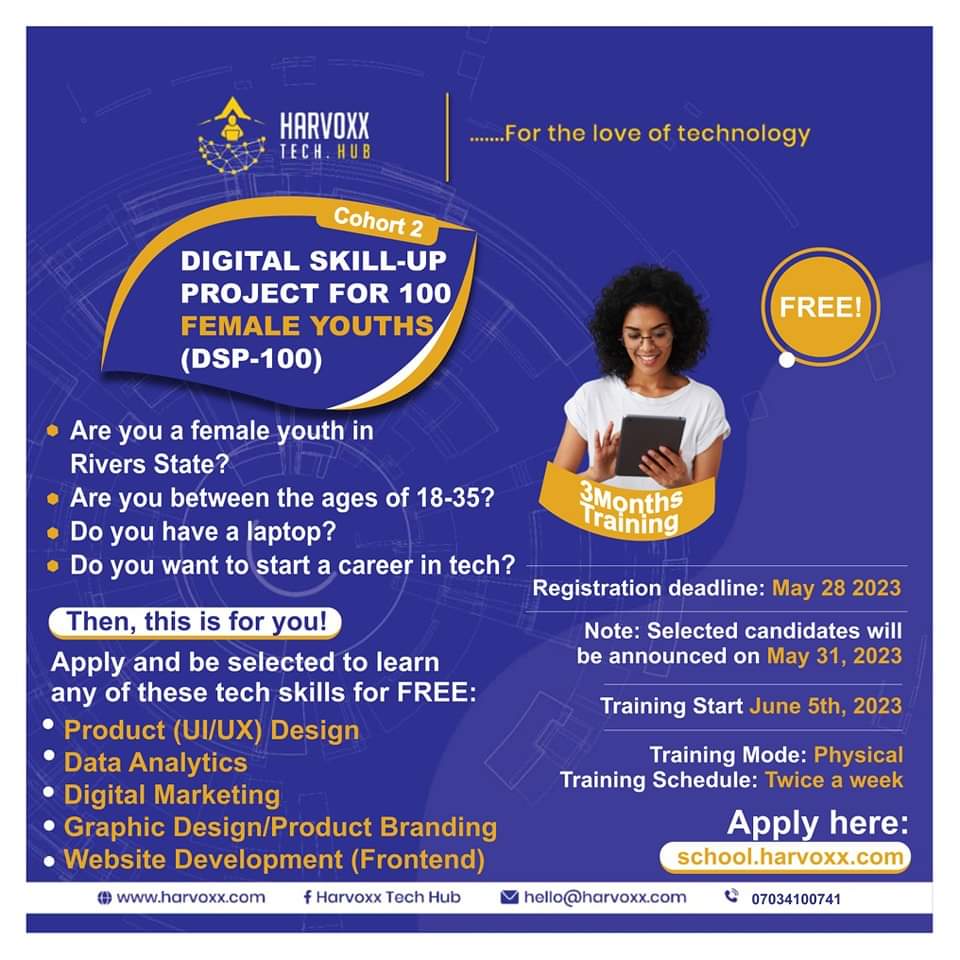
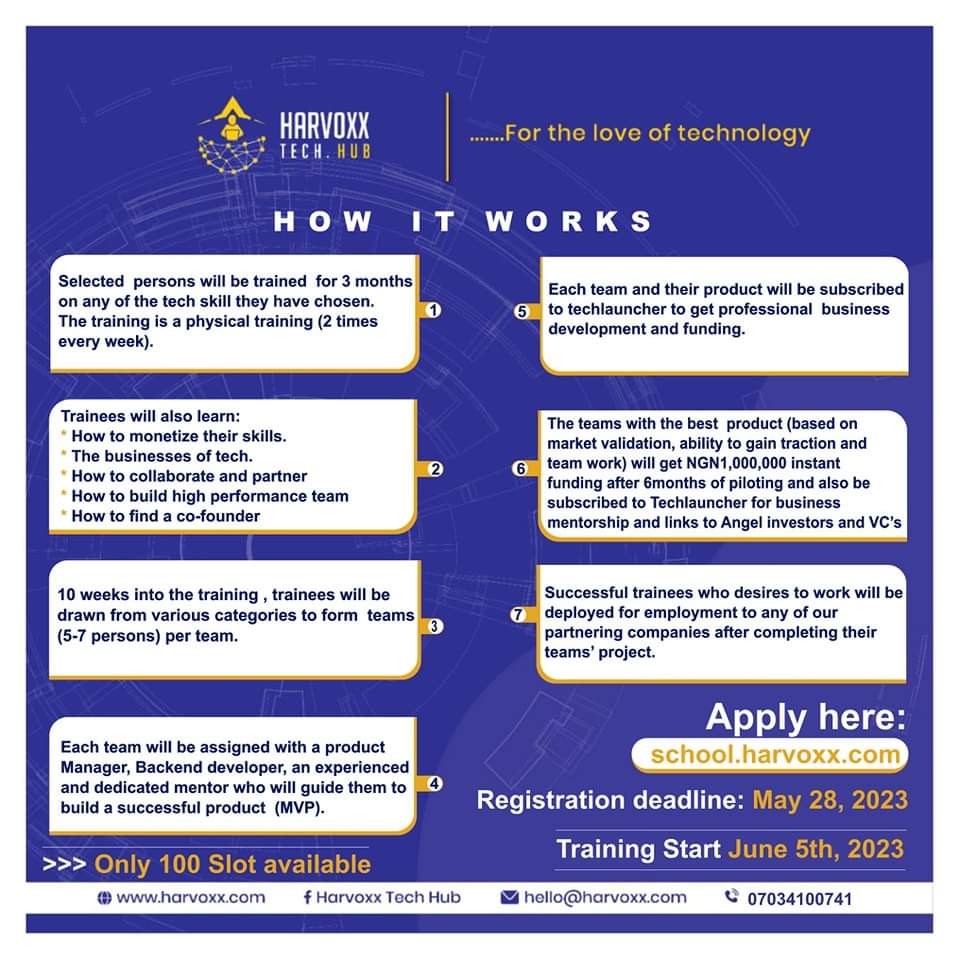
2. Scholarships: There are many scholarship opportunities available for girls in Africa who want to pursue a career in ICT. These scholarships can help cover the costs of education, including tuition fees, books, and other expenses.
3. Internships: Many tech companies in Africa offer internship programs for girls interested in ICT. These internships provide valuable work experience and help girls develop their skills in a real-world setting.
5. Mentorship programs: Mentorship programs provide girls with guidance and support as they navigate the challenges of pursuing a career in ICT. These programs connect girls with experienced professionals who can provide advice and help them develop their skills.
6. Coding competitions: Many coding competitions are held in Africa that are specifically designed for girls. These competitions give girls the opportunity to showcase their coding skills and compete for prizes and recognition.
7. Online courses and resources: There are many online courses and resources available for girls who want to learn more about ICT. These resources can help girls develop their skills and knowledge at their own pace, from anywhere in the world.
7. Hackathons: Hackathons are events where programmers, designers, and other tech professionals come together to collaborate on projects. Many hackathons in Africa are specifically designed for girls and women, providing them with the opportunity to work on projects and develop their skills in a supportive environment.
8. Women in Tech Conferences: There are several conferences held in Africa each year that are specifically focused on women in technology. These conferences, such as the Ladies Can Tech event organized by Harvoxx Tech Hub in Port Harcourt, provide girls with the opportunity to connect with other women in the field, learn from experts, and gain inspiration and motivation to pursue their own careers in ICT.

9. Girls Who Code Clubs: Girls Who Code is a global organization that works to close the gender gap in technology by providing opportunities for girls to learn coding and other technology skills. Girls Who Code clubs have been established in many countries across Africa, providing girls with a supportive community where they can develop their skills and gain confidence in their abilities.
10. Startup Incubators: Many startup incubators in Africa offer support and resources to girls who are interested in launching their own tech startups. These incubators provide access to funding, mentorship, and other resources that can help girls turn their ideas into successful businesses.
11. STEM Education Programs: STEM means (Science, Technology, Engineering, and Mathematics) education programs are becoming increasingly popular in Africa, providing girls with the opportunity to develop their skills in these fields. Many of these programs are specifically designed for girls and work to create a supportive and inclusive environment where they can thrive.
12. Tech Camps: There are many tech camps held in Africa each year that are specifically designed for girls. These camps provide girls with the opportunity to learn about coding, robotics, and other technology skills in a fun and engaging environment.
Overall, there are many opportunities for girls in ICT in Africa. With the proper training, support, and resources, girls can develop the skills and knowledge they need to succeed in this exciting and rapidly growing field.
We can all play a role in promoting gender equality in the tech industry. This includes challenging stereotypes and biases that may discourage girls from pursuing ICT careers, as well as promoting diversity and inclusivity in our workplaces and communities. By working together, we can create a more equal and equitable world where girls and women have the same opportunities to succeed in ICT and other fields.
In conclusion, the International Day for Girls in ICT is an important initiative that promotes gender equality and empowers young women to pursue careers in technology. It is a reminder that women have a vital role to play in the tech industry and that their contributions are essential to creating a brighter future for all. Let us all work together to inspire and support the next generation of female tech leaders.


